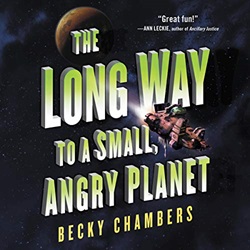
 The Long Way to a Small, Angry Planet
The Long Way to a Small, Angry PlanetReview posted June 5, 2024.
HarperAudio, 2019. 14 hours, 24 minutes.
Review written June 4, 2024, from a library eaudiobook.
2019 Hugo Award winner (with following books) for Best Series
I heard about this book from attending a library staff webinar about fantasy and science fiction books, and I was glad I followed the recommendation.
The first character we meet in this book is of a young adult woman named Rosemary traveling to her first job off Mars on a spaceship. She's paid all her money to change her identity and we don't know why. The next scene shows the ship's captain being told off by the algaeist for hiring such an inexperienced person. And in that interaction we learn that Ashby is a patient man who wants what's best for his ship, that Corbin is abrasive to people, but good at his job, and that Rosemary is a highly qualified clerk who speaks multiple languages, but she's young.
This book reminded me of a season of Star Trek or maybe Firefly, since it's a ragtag bunch and the captain is in business for himself, not part of a government fleet. The ship, Wayfarer, is cobbled together from mostly secondhand parts, but it's sturdy, and it gets the job done -- the job being to create wormholes that other ships can travel through.
In the beginning of the book, the interplanetary alliance they're part of has decided to add a group of aliens who are still at war among themselves -- at least one faction of them. So Ashby jumps at the chance to get the lucrative job of constructing the wormhole to connect that planet with the rest of the alliance.
But of course since the wormhole doesn't yet exist, it will take them almost a full standard year to get there to put the other end of the wormhole in place. This book takes us with the crew on that journey.
This is a story about world-building and about community among extremely diverse cultures. There are three non-human sapients as part of the crew, as well as an A.I. entity monitoring the ship. Every crew member gets some time as viewpoint character, so it's very much episodic. The different episodes show the characters' interrelationships. This includes stories of intimate relationships, some not with the same species, but there's not an overarching love story, so those descriptions have us a little at a distance.
But if you like world-building in a science fiction novel, this one has it in spades. Arising naturally out of the story, we get a detailed picture of what life might be like living in space and interacting with multiple species that evolved differently from us. Humans aren't particularly admired among the other cultures, having been let into the alliance almost out of pity. The book shows the implications of many different things that might come up in such a society.
My one quibble -- call me stone-hearted, but I can never bring myself to believe that A.I. entities can experience pleasure or pain -- or love. I just don't have a lot of compassion in my heart for machines so when an author tries to pluck my heartstrings with something happening to a machine -- no matter how lifelike it seems -- it's going to fail. I try to care for the sake of the story and at least relate to how the humans around them would miss the A.I. they're used to if something bad happens -- but I don't think it has the poignancy the author's going for.
But the characters are delightful. (And don't get me wrong - I enjoyed the character of the A.I.) Even the abrasive one that nobody really likes turns out to be someone we care about when trouble comes his way. And many of them are downright lovable. I thoroughly enjoyed spending time with these people. It did feel episodic -- but that way I got insights into each character's background and current situation and what they cared about. It was also fun when a couple of the aliens grumble about things humans do - giving a new perspective on what's "normal."
This whole delightful story is a grand adventure about a group of wildly different people living and working together and caring about each other.
